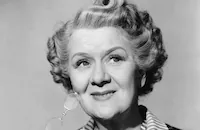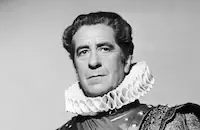Army Girl
Cast & Crew
George Nicholls Jr.
Madge Evans
Preston Foster
James Gleason
H.b. Warner
Ruth Donnelly
Film Details
Technical Specs

Synopsis
Captain Dike Conger, a tank expert, is assigned to the Thirty-first Cavalry Regiment to determine whether it should convert to the use of small tanks suitable for the desert instead of horses. Accompanied by his cocky mechanic friend, Three Star Hennessy, Dike encounters opposition from most members of the regiment who want to continue using horses. Dike, who considers himself a "ladies' man," agrees to go on a blind date arranged by his old friend, Captain Bob Marvin, on the condition that she be a civilian, not an "army girl." Because of a mistake made by Three Star, however, his date turns out to be Julie Armstrong, daughter of camp commander Colonel Armstrong, who uses the name Lucy May Praxton to break out of her boring, pre-arranged existence. Though he is angered by her deception at first, Dike soon relents, and the two begin to fall in love. Some time later, a contest is held between tanks and horses to determine which is more effective. The tank wins the contest, and the details are forwarded to Washington while the post awaits the government's decision about the horses. As the weeks pass, Dike and Julie decide to marry, but as Dike is about to tell the colonel, Armstrong reveals that tanks will replace the horses and that Dike will be replacing him as post commander, thus angering Julie, who breaks the engagement. When word reaches Harry Ross, an old-fashioned sergeant and rival of Three Star, he alters a connecting rod in a tank which is to carry Dike and Three Star at the transition ceremony. When, on the day of the ceremony, Ross sees the colonel enter the tank with Three Star instead of Dike, it is too late to stop them, and they are both killed in the wreck. Captain Joe Schuyler, a rival for Julie's affections, is the first to reach the tank, and hears Three Star's dying words implicating Ross, but he decides to suppress the information. After a court-martial in which Dike is ruled negligent and responsible for the accident, Schuyler proposes to Julie. When she still refuses him, he realizes that she will never love him and forces the truth out ot Ross before the military judges, thus incriminating Ross and himself, and exonerating Dike. Finally free, Dike and Julie reconcile.

Director
George Nicholls Jr.
Cast

Madge Evans

Preston Foster

James Gleason

H.b. Warner

Ruth Donnelly

Neil Hamilton

Heather Angel

Billy Gilbert

Ralph Morgan

Barbara Pepper
Ralph Byrd

Guinn "big Boy" Williams

Robert Warwick
Allen Vincent
Pepito
Paul Stanton
Dewey Robinson
Crew
Alberto Colombo
Paul Conlon
B. Reeves Eason
Kenneth Holmes
Charles L. Lootens
John Victor Mackay
Ernest Miller
William Morgan
Samuel Ornitz
Irene Saltern
Armand Schaefer
Murray Seldeen
Sol C. Siegel
Barry Trivers
Harry Wild
Al Wilson
Hal Yates
Victor Young

Film Details
Technical Specs

Award Nominations
Best Cinematography
Best Cinematography
Best Music Original Dramatic Score
Best Sound
Quotes
Trivia
Notes
According to a news item in Hollywood Reporter on December 24, 1935, Republic had just purchased the rights to Charles L. Clifford's story. Another news item in Hollywood Reporter in February 1936 noted that Bernard Schubert was leaving the studio to go to Broadway after completing his script for Army Girl. No later sources mentioned this script, and it has not been determined whether or not any of Schubert's work was incorporated into the completed film. A May 10, 1937 Hollywood Reporter news item reported that the picture was to be shelved indefinitely, however, the property was re-activated in April 1938 when news items in Hollywood Reporter noted that Richard Arlen had been cast in the role of Dike Conger. News items also noted that writers Conlon and Yates, who are credited with additional dialogue in Screen Achievements Bulletin, wrote comedy "bits" for James Gleason and Billy Gilbert. The copyright entry for the film, as well as Motion Picture Herald, credit Alberto Colombo with the score, while the film and all other sources list Young. Official billing credits submitted to the AMPAS library requested that Colombo's name be removed from the previously submitted credits and Young's be inserted instead. Colombo, who had been the head of Republic's music department, left the studio in late June 1938 to go to Columbia Pictures, which May account for the change. A Hollywood Reporter production chart lists Jack Marta as the cameraman, while all other sources list Harry Wild and Ernest Miller. A news item in Hollywood Reporter on May 7, 1938 noted that Army Girl was the second largest budgeted picture in Republic studio's history. It also noted, incorrectly, that B. Reeves Eason was to direct the story sequences and that George Stevens (rather than George Nicholls, Jr.) was to direct the action sequences. According to various news items, portions of the picture were filmed on location in Lone Pine, CA. Army Girl was nominated for three Academy Awards-Best Cinematography, Best Music (Original Score) and Best Sound Recording.
This was the last film of actress Madge Evans, who retired from the screen shortly after her marriage to playwright Sidney Kingsley. Evans began her career as a child in feature films when she appeared in the 1914 All Star picture Shore Acres, directed by John H. Pratt (see AFI Catalog of Feature Films, 1911-20;F1.3989). Evans died in 1981.

Miscellaneous Notes
Released in United States 1938
Released in United States 1938











